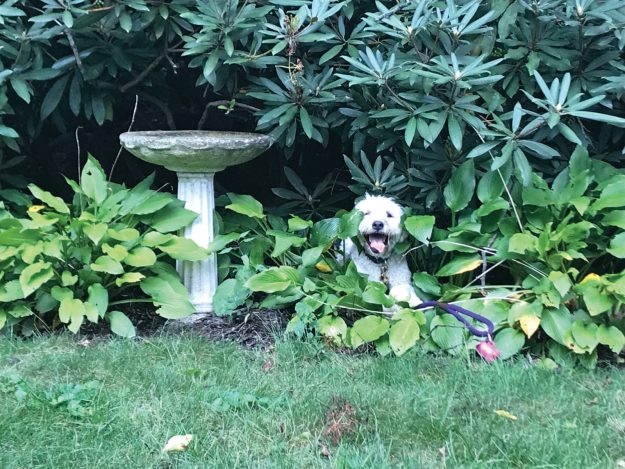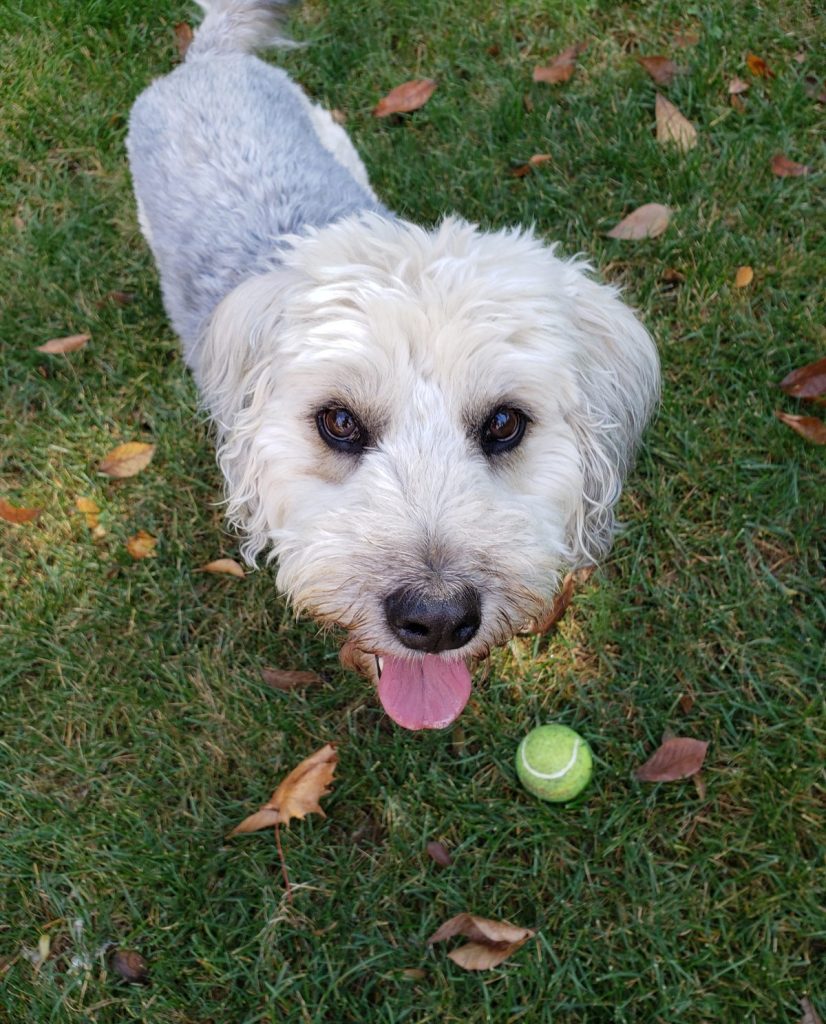The other day I saw a bumper sticker that said I WANT TO BE THE PERSON MY DOG THINKS I AM. I can relate. My dog, Brooklyn—a scruffy, happy rescue pup—thinks the world of me, for some unfathomable reason. I walk through the front door after being gone for a while and she wags her tail with such adoring abandon that it’s basically a full-body wag, her whole being bending and contorting with delight. Whoever she thinks I am, it must be someone pretty spectacular.
But then I began to wonder if maybe the bumper sticker had it a little wrong—maybe, somehow, you already are the person your dog thinks you are—it’s just that your dog’s the only one who can see it.
Brooklyn was 6 months old when my wife and I adopted her. She’d been driven up north in a van with her brothers and sisters—a 12-hour ride all the way from South Carolina—and her white paws were pink from the Pepto Bismol they’d given her to combat the car sickness. She was bright-eyed and skittish, and a little funny-looking, too, with a skunk’s stripe of black fur running down her back and a thin, possum-like tail. It was love at first sight.
I could say she was unfailingly our dog from the start, full of adoration and trust—and this would be true—but I think it’s also true that she would have unfailingly been anyone else’s dog, too. She loved everyone she met equally, it seemed, and with boundless enthusiasm. This was a little disconcerting, though mostly it just made me proud. She’d see a stranger halfway down the block and start wagging her tail and straining at the leash, and it was a rare person whose face did not light up at seeing how excited this oddly happy little creature was to encounter them—and for no apparent reason, either. Some, confused by her ebullience, thought she expected a treat, and they’d say, “I don’t have anything for you, pup.” “That’s OK,” I’d inform them, “I think she just wants to say hello.” And so they’d bend down and say hello back, and Brooklyn would do her happy butt-wiggle thing, turning around and around ecstatically and getting patted, and then she would sit down on their feet so that they couldn’t go anywhere, and lean lovingly into their shins.

It is perhaps not surprising that Brooklyn, being such a social creature, became an instant celebrity in our neighborhood. Everyone knew her, and if they didn’t, they wanted to. Not long after we got her, she was hanging out on our stoop, all collapsed in the arms of our neighbors’ daughter, and this random woman walked up and said, “Is this Brooklyn? I’ve heard so much about her, I just wanted to say hi.” She was like the little doggy mayor of Carroll Gardens, trotting around with her tail up in the air, wagging it freely at everyone she encountered, dishing out adoration and basking in it in return, and I have zero doubt that more people in our neighborhood knew Brooklyn’s name than they did our own.
But this is of course the way it always is, especially in the big city: generally, you’re allowed to say hello to dogs—to people, not so much. After all, it is our God-given right as New Yorkers to ignore everyone, and to be ignored by them, too. Uninvited human interaction sparks suspicion, and for good reason: usually, when strangers greet you on the city streets, they want something from you—a signature, a donation to a charity, time, loose change. Throw a dog in the mix, however, and the whole dynamic changes. Dogs become a kind of medium, an excuse for us to interact like humans again, if only for a moment or two. “I’ve been thinking about getting another dog,” a nice man I’d never met before confessed, as Brooklyn cuddled up to him in her friendly way on an early spring morning. He explained that his last dog had passed away a year or two before. “If only we could all be like dogs. . . . Communication, I guess would be the word. . . . Well, I’ll leave you to your business. Oh, I’m Marty, by the way.” “Nice to meet you, Marty. I’m Taylor.”
Maybe what’s so unfathomable is not that our dogs see us like this, but that we are so unable—or unwilling—to see it in ourselves.It always amazed me how Brooklyn’s simple presence could be so wonderfully disarming, how her innocent greetings could make people’s days. My young son, Ollie, has a similar effect on people, and so do his hellos. Much like Brooklyn—out of the blue and for no particularly good reason—he’ll see someone coming down the street and come right out and say “Hi!” It is a disconcertingly cheerful salutation, and it often shocks them out of whatever dark, hard dream they were cloaked in. “Hi!” they say back, their faces suddenly open and bright. And I notice something else on their faces, too, at moments like this: a kind of startled wonder, a delighted disbelief: “Wait, why is this dog (or kid) saying hello to me?” It seems as though people are not used to creatures being so happy to see them—which is, if you think about it, kind of sad.
The truth is, I’m not used to it either. I come home from a long day, open the door, and there’s Brooklyn enthusiastically wagging her tail or Ollie shouting “Daddy!” (which is basically the verbal equivalent). And oh man does it feel good to be greeted like that—if there’s anything cold in my chest it immediately starts to melt. But even though I appreciate their love, that doesn’t mean I understand it. Just who do they think I am, anyway?
I mean, sure: with Brooklyn, for instance, I give her good pats and scratches, I give her food and water, I walk her in the cold winter night and pick up her steaming poop. In short, I love her, and perhaps this warrants being loved back—but to that extravagant extent? It makes me wonder if maybe she’s just not seeing me clearly, if somehow her vision is limited, incomplete, askew. After all, it may sound like I’m making Brooklyn out to be some kind of enlightened being here, but let’s not forget that she is, in fact, a dog. She sniffs other dogs’ butts; she likes eating deer poop. Am I really to trust that such a creature’s perception of me is the correct one, that she somehow knows me better than I know myself? And then there’s the question of her objectivity, too—the way her vision seems clouded, if not by ignorance, then at least by adoration—which perhaps is what people mean when they say that love is blind.
Of course, it’s entirely possible that it’s the other way around, and only love can really see. Yes, maybe what’s so unfathomable is not that our dogs see us like this, but that we are so unable—or unwilling—to see it in ourselves.
I’ve been studying Zen Buddhism in downtown New York City at the Village Zendo for more than ten years now, and one of the lessons they try to impart is that each of us is Buddha. Before we sit down to meditate, for instance, we bow to our cushions, because, as one teacher put it, “That’s where Buddha sits.” And on the wall of the zendo is a painting of a phrase from Kerouac’s Dharma Bums: “Equally empty, equally to be loved, equally a coming Buddha.” It seems that not only are we buddhas (or at least in the process of becoming buddhas), we are somehow, remarkably, deserving of being loved.
This is, as I mentioned, rather hard for me to swallow. (Apparently, having been raised with a heightened sense of self-worth, millennials don’t have this problem, though I’m not sure I buy that claim.) But me, I’ve always had a tough time with this, and I’m not alone. I am reminded of the way my beautiful wife, Lizzy, does not know, cannot fathom, that she is beautiful. “Oh, I’m sort of pretty sometimes, I guess,” she says, and she is not being coy. She really doesn’t get it, can’t see it. It is this way with all of us, perhaps, one way or another. We cannot see how beautiful we are, how worthy we are of being loved. Or at least it’s that way with me: I cannot see it in myself, and I cannot understand why any other creature would see it in me, either—and this includes not just my dog, but my wife, my son, my sister, my friends, and so on.
I’m not quite sure what I did, besides being born, to inspire such self-loathing. I guess I just know me too well. Or perhaps the real truth is: I don’t. Because this basic confusion—the great strangeness and miracle of being loved when you can’t imagine why—forces you to reconsider everything, including how you see yourself. Maybe I’m someone different than I thought I was. Or maybe the point is that I don’t need to be anyone different. After all, through a dog’s eyes, just being an ordinary, sad, bighearted human is enough.
Of all the ways Brooklyn shows us she loves us—wagging her tail, snorting contentedly when I rest my forehead against hers, occasionally putting a reassuring paw on me—perhaps the most basic is simply that she lets us pet her. And not just us, but everyone she encounters. It’s not uncommon for her to sprawl out on the sidewalk, shamelessly, and offer up her soft underbelly for a stranger to rub—an act of such trust. This is perhaps the scariest part of loving someone—allowing yourself to be loved, too. For as Maya Angelou reminds us: somehow, you have to find “the courage, the unmitigated gall to accept love in return.”
I guess Brooklyn’s got a lot of gall. I mean, who does she think she is?
Thank you for subscribing to Tricycle! As a nonprofit, we depend on readers like you to keep Buddhist teachings and practices widely available.
